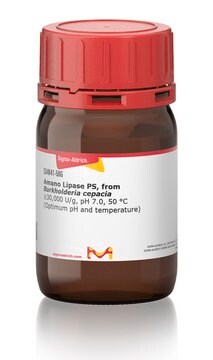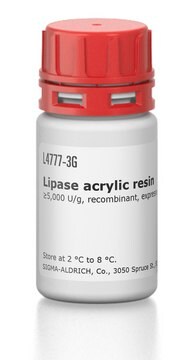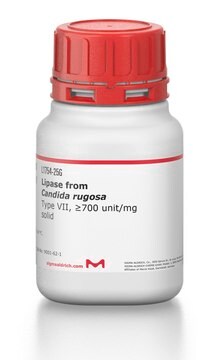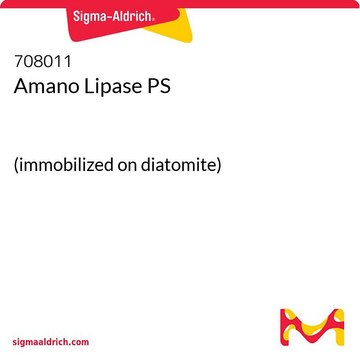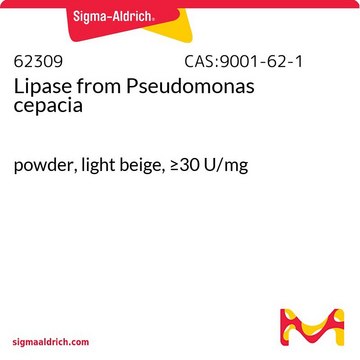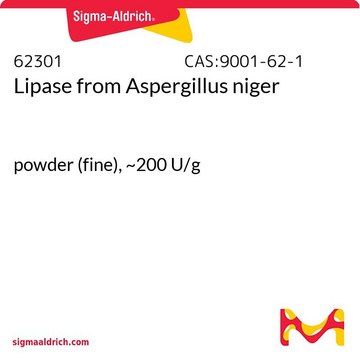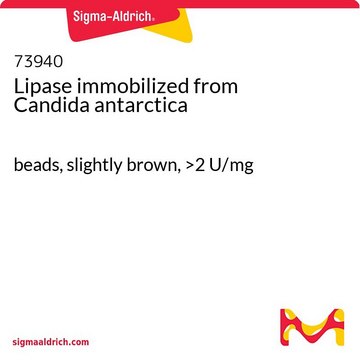534730
Amano Lipase from Pseudomonas fluorescens
beige-brown, ≥20,000 U/g
Sinónimos:
Lipase, triacylglycerol, Triacylglycerol lipase
Iniciar sesiónpara Ver la Fijación de precios por contrato y de la organización
About This Item
Productos recomendados
biological source
Pseudomonas fluorescens
Quality Level
specific activity
≥20,000 U/g, pH 8.0, 55 °C (Optimum pH and temperature)
≥20,000 U/g
color
beige-brown
InChI
1S/C11H9N3O2.Na/c15-8-4-5-9(10(16)7-8)13-14-11-3-1-2-6-12-11;/h1-7,16H,(H,12,14);/q;+1/b13-9-;
InChI key
QWZUIMCIEOCSJF-CHHCPSLASA-N
Application
Amano Lipase from Pseudomonas fluorescens can be used as a biocatalyst in the:
Amano Lipase can also immobilized on silk fibroin spheres to prepare optically active epoxides by enzymatic kinetic resolution of halohydrins.
- Hydrolysis and transesterification of parabens (para-hydroxybenzoic acid esters).
- Enzymatic kinetic resolution of chlorohydrins.
- Regio-selective acylation of andrographolide with different acylating agents to synthesize andrographolide derivatives.
Amano Lipase can also immobilized on silk fibroin spheres to prepare optically active epoxides by enzymatic kinetic resolution of halohydrins.
signalword
Danger
hcodes
pcodes
Hazard Classifications
Resp. Sens. 1
Storage Class
11 - Combustible Solids
wgk_germany
WGK 1
flash_point_f
Not applicable
flash_point_c
Not applicable
ppe
Eyeshields, Gloves, type N95 (US)
Elija entre una de las versiones más recientes:
¿Ya tiene este producto?
Encuentre la documentación para los productos que ha comprado recientemente en la Biblioteca de documentos.
Los clientes también vieron
Immobilization of Amano lipase from Pseudomonas fluorescens on silk fibroin spheres: an alternative protocol for the enantioselective synthesis of halohydrins
Ferreira IM, et al.
Royal Society of Chemistry Advances, 7(21), 12650-12658 (2017)
Lei Wang et al.
Journal of hazardous materials, 354, 145-152 (2018-05-12)
Hydrolysis is generally considered as the main pathway for the degradation of ester-type pollutants in aquatic environments. In this study, we found that when methanol or ethanol presented as the external carbon in the activated sludge, transesterification is very important
Michael Thomas Zumstein et al.
Environmental science & technology, 51(13), 7476-7485 (2017-05-26)
Biodegradable polyesters have a large potential to replace persistent polymers in numerous applications and to thereby reduce the accumulation of plastics in the environment. Ester hydrolysis by extracellular carboxylesterases is considered the rate-limiting step in polyester biodegradation. In this work
Dominik Koszelewski et al.
Chemistry (Weinheim an der Bergstrasse, Germany), 25(43), 10156-10164 (2019-05-29)
A new protocol based on lipase-catalyzed tandem reaction toward α,β-enones/enoesters is presented. For the synthesis of the desired products the tandem process based on enzyme-catalyzed hydrolysis and Knoevenagel reaction starting from enol acetates and aldehyde is developed. The relevant impact
Nuestro equipo de científicos tiene experiencia en todas las áreas de investigación: Ciencias de la vida, Ciencia de los materiales, Síntesis química, Cromatografía, Analítica y muchas otras.
Póngase en contacto con el Servicio técnico